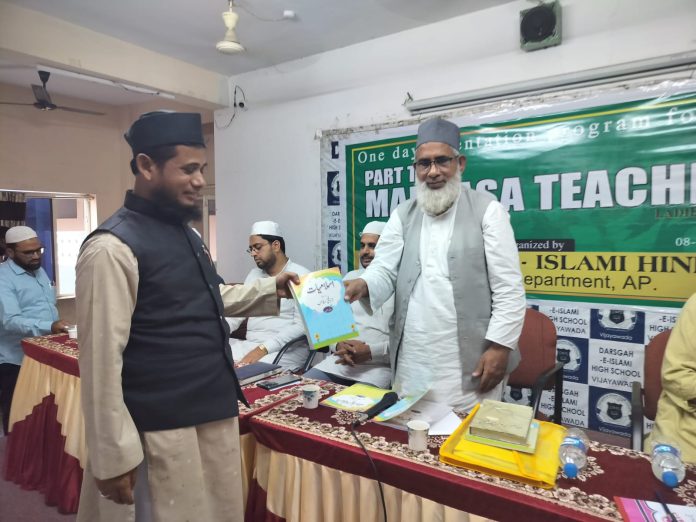Vijayawada: A one-day orientation and training program was organized in Vijayawada, Andhra Pradesh, under the auspices of Markazi Taleemi Board, Jamaat-e-Islami Hind. The program aimed to highlight the necessity and significance of part-time madrasas and provide guidance and training for their teachers.
The event saw participation from notable personalities, including Amir-e-Halqa of Andhra Pradesh, Mohammad Rafiq; Assistant Amir-e-Halqa, Shaukat Faheem; National Coordinator, Islamiyat Deeni Makatib, Maulana Inamullah Falahi; Assistant Coordinator, Islamiyat Deeni Makatib, Maulana Mohammad Imran Nadwi; Secretary of Education, AP, Shakir Hussain; Secretary of JIH Andhra Pradesh, Mohammad Kareem, and several other dignitaries.
Maulana Inamullah Falahi delivered an address on “Curriculum and Teaching Methods.” He introduced the four-volume curriculum of Islamic Studies, which includes lessons on Quranic recitation (Nazra), memorization of selected Surahs, prayers, Hadith, Seerah (Prophetic biography), Fiqh (Islamic jurisprudence), history, and social studies. He also demonstrated practical teaching methods using a blackboard.
Maulana Mujahid Khan Umari elaborated on the importance of education. Following this, Shaukat Faheem delivered a talk on “Introduction, Importance, and Vision of Part-Time Madrasas.” He emphasized that these madrasas aim to equip children with Islamic teachings and social awareness within a limited time frame.
Shakir Hussain, Secretary of Education, discussed the current state and the number of part-time madrasas operating in Andhra Pradesh. He mentioned that while many madrasas are running successfully in the state, the systematic documentation of their data is an ongoing process.
Mohammad Kareemuddin gave an insightful talk on “Connecting Religious Knowledge with Practical Life,” elaborating on how students’ everyday lives can be harmonized with Islamic teachings.
After the main sessions, Maulana Mohammad Imran Nadwi addressed the topic of teaching methods based on the psychological age and mental level of students. He highlighted the importance of psychological factors in the upbringing of children from various age groups.
The program concluded with closing remarks by Mohammad Rafiq and an invocation led by Maulana Inamullah Falahi.
Following the event, a meeting was held with the Andhra Pradesh Part-Time Committee, where the committee’s responsibilities and future plans were discussed.
This training program proved to be a significant milestone for teachers of part-time madrasas in Andhra Pradesh, and it is expected to bring further improvements in the madrasa system.




